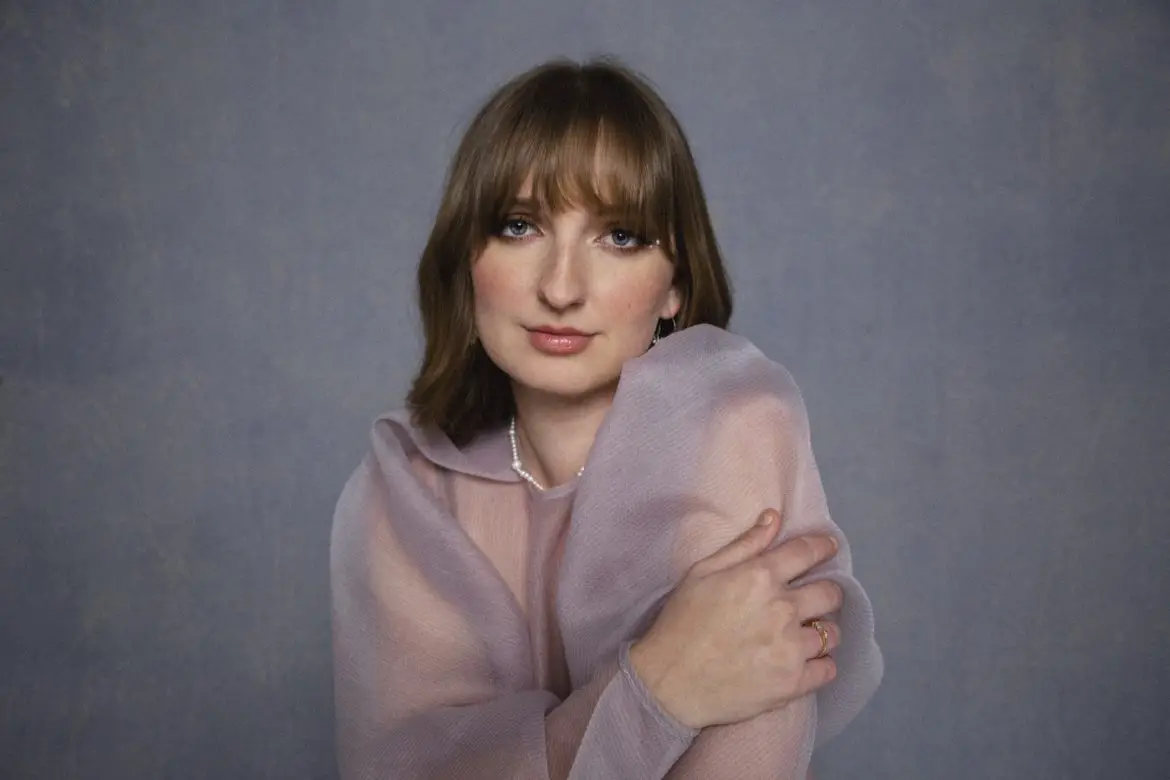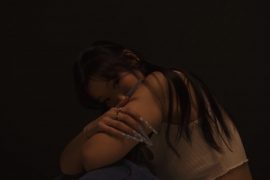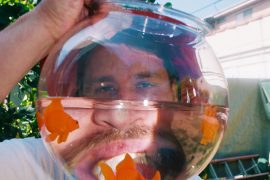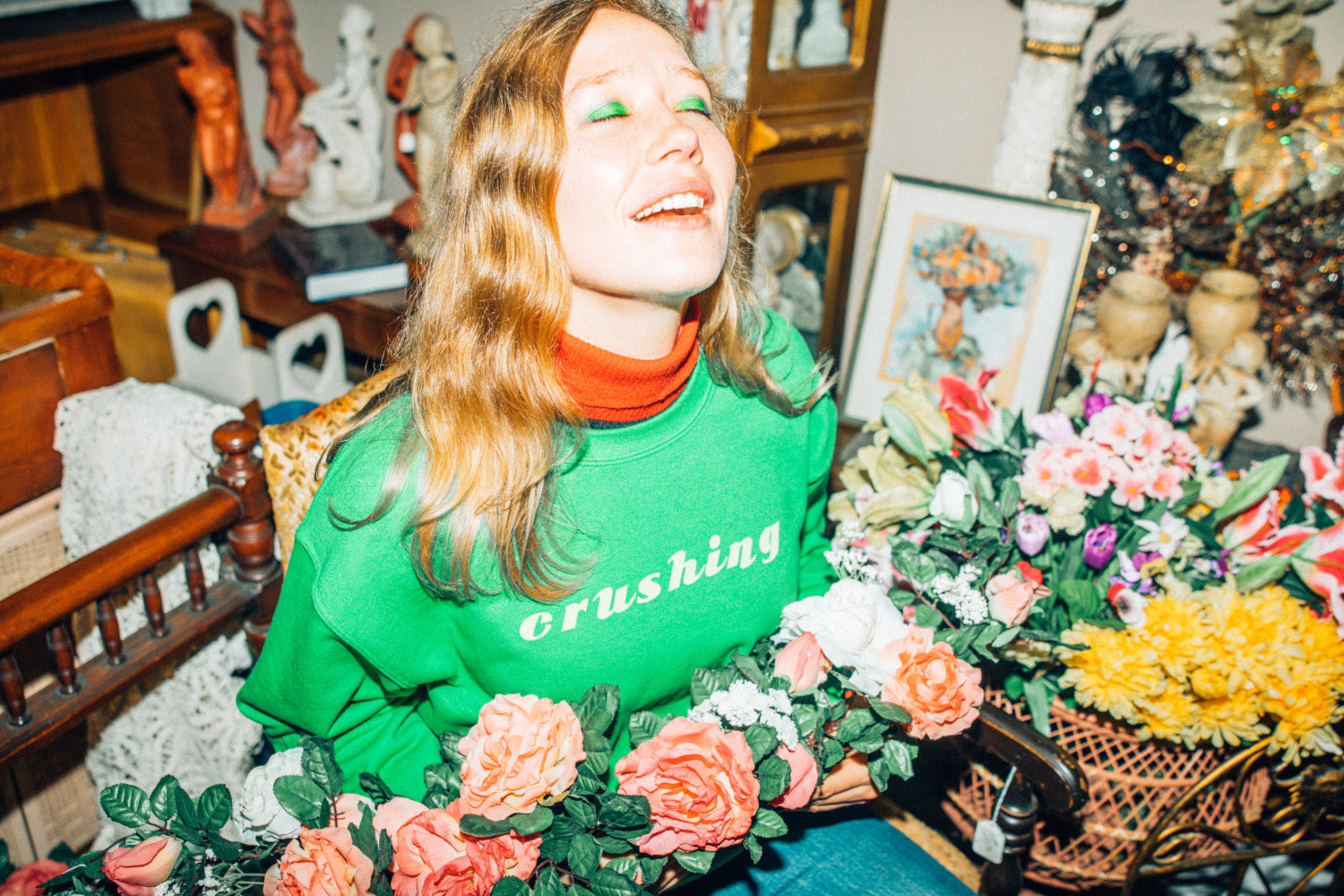Madison Cunningham is no stranger to an existential query; apt to painstakingly pick through the depths of her subconscious in attempts to make sense of the enigma that is human life. Her upcoming sophomore record, ‘Revealer,’ is a direct reckoning of her innermost thoughts, providing a scrutinizing self-examination of her psyche for the entire world to witness. And while the record is due via Verve Forecast on Sept. 9, Cunningham shares with Atwood Magazine an exclusive peek into the time that created ‘Revealer.’
Stream: “In From Japan” – Madison Cunningham
Over the past couple of years, Madison Cunningham has been hard at work, haphazardly piecing together the jagged shards of a broken mirror. And while said mirror is now riddled with cracks, Cunningham’s image is clearer than ever.
Cunningham’s discography has long been marked by her cunning wit and continually expansive musical innovation. With two Grammy nominations and hefty endorsements from artists such as Harry Styles, Sara Bareilles and Andrew Bird under her belt, Cunningham’s artistry is bonafide in its melodic majesty and resonant articulations.
Her newest record, Revealer, due September 9 via Verve Forecast, is a grueling bildungsroman in which this musical polymath summits a metaphorical mountain only to be greeted by yet another unforgiving peak to traverse over.
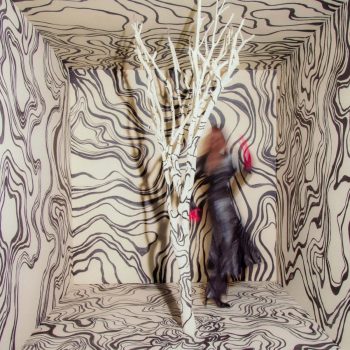
Revealer is a lesson in Cunningham’s self-defined “manic elegance” — a journey of arduous self-discovery that does not end with any semblance of closure. The 11 tracks that come presented as Revealer are of the same thematic ilk as the musician’s previous work; a self study brimming with timely introspection. But this time, Cunningham holds nothing back. The singer/songwriter swiftly picks up on and exposes the nuances of her own mind; after all, no one knows — and can critique — Cunningham better than Cunningham herself. She relinquishes any semblance of control, letting her anxiety and insecurities permeate every minor detail of this intimate, vulnerable, and strikingly raw work of art.
In Revealer, Cunningham weaponizes all of the praises that she has received throughout her career. Along with the dynamic instrumentals that work to elaborate on Cunningham’s already complex foundation of sound, her acclaimed wordplay serves to trap and confound the musician as she talks circles around herself with her employment of snappy stream-of-consciousness metaphors.
Stemming from a time of inner turmoil produced by both the tempestuous machinations of her mind as well as the chaotic state of the outside world, Revealer illustrates Cunningham’s time spent exiled in a perpetual state of limbo. During this era of her life, the musician’s growth was stagnated by her own sense of failure and shame — and thus, her thinly veiled struggles and unapologetic honesty are omnipresent within every track. Though, these observations do not come bringing slews of optimistic promises or lofty goals of self-improvement in the interest of preserving Cunningham’s sanity; all that is present is her recognition and acceptance of the state she is in. Revealer is, thus, a timely purge of all of the emotions and thoughts that have been holding the singer/songwriter back; serving as a mindful release and a surrender of all that is to come.
Music has always served as a means for Cunningham to process life.
“Music can change, and it changes with you,” she asserts. “What continues to keep it meaningful is the fact that music can speak to any phase of your life. It’s usually a direct reflection of you in that era and time period.” In sorting through Cunningham’s discography, one can trace a clearly detailed roadmap of her journey through this life, with each song acting as a monument built on years and years of growth.
And while Cunningham will always gravitate toward the creation of music, she remains wary of the workings of the industry.
The push and pull of the music industry is one Cunningham has tirelessly worked to gain footing in; “It’s so easy to take yourself as a sacrifice to either the image or the business — or whatever it is that people are asking of you,” she confesses. “No one will care about your own health as much as you will. Learning how to advocate for yourself is the hardest piece.”
Cunningham will in no way be a sacrificial lamb to the push and pull of the business. She has found a surefire way to gain some much-needed leverage by standing firm in her boundaries; spending years honing her utterance of one magic word: ‘no.’ “The more that I exercise [saying no], and try to reserve some space for myself, the healthier I am,” Cunningham observes. “You can never really feel like you’re in control, because that’s not really possible, but [saying no] makes me feel like I’m holding a sort of agency over my life.”
If there’s one place where Cunningham feels safe being out of control, it’s in the studio. The singer/songwriter views experimentation as one of the many perks of being an artist. If the formulation of her art poses a challenge to her mind, then it means she’s going down the right path. There is no ‘tried-and-true’ creative process for Cunningham; she affirms that while many of her ventures into new songwriting territory don’t always work out, “It’s a worthy endeavor even if it doesn’t become a product. Art is a transient thing — it’s always moving, it’s always changing, but it’s always worth chasing down.”
And while Cunningham has spent years in the pursuit of curating a unique voice and image, she has faced the dual edged sword of her work continuously being compared to that of many great musicians of the past. By no means is the musician hesitant to express admiration and gratitude for the various influences that have shaped her sound, but the novelty of being likened to her predecessors wore off after these comparisons began to seem like the only thing people could say about her music. “People — being very well meaning — love to draw comparisons, because that’s all we know how to do […],” Cunningham illustrates. “To us as people who are trying to make a different impression, or something new, it can feel so offensive.” Revealer showcases Cunningham’s efforts to reclaim her voice as an artist in her own right — an undertaking in which she undoubtedly (and unsurprisingly) succeeds in.
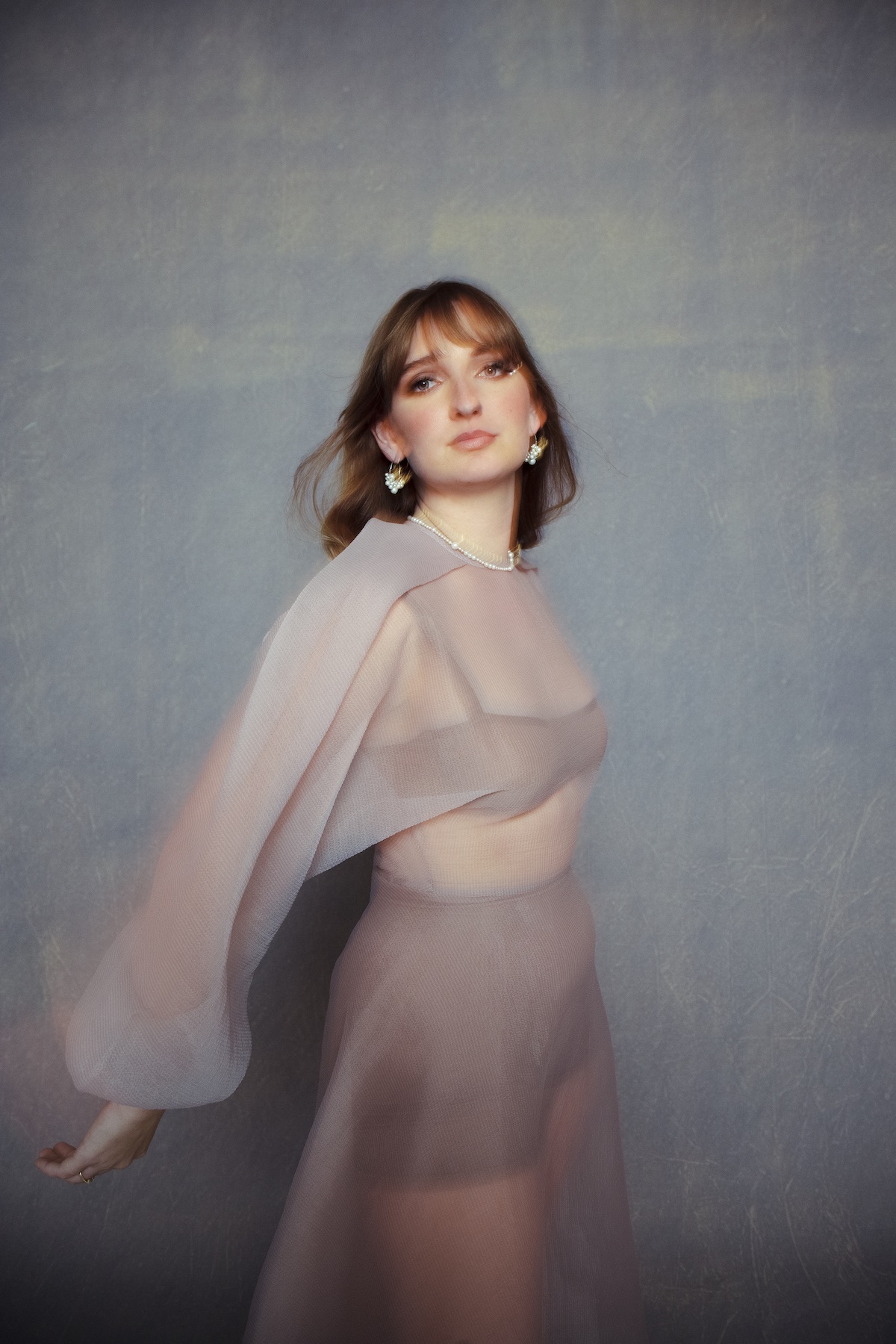
“I needed to be able to kind of throw paint at the wall, explore, see what was possible, and engage in childlike curiosity,” Cunningham confides when explaining the artistic motivations that created the record’s distinctive soundscape. “That, for me, made the juxtaposition with the hard personal stuff I was going through, and really brought perspective to the table. It helped me to not just be isolated in my own head, but to have different angles to each song.” Evidently, Cunningham persevered through all of the emotions that rose up during the process with unfettered resilience, trusting that all of this arduous inner-work would pay off in the long run.
Rest assured, this artist is in it for the aforementioned long run; “The journey of finding your own voice and what you want to say is a forever endeavor,” Cunningham affirms. This exploration of the self will last for eternity, and Cunningham will take the opportunity to revel in it for as long as she can; with Revealer acting as another beautiful, yet honest scrapbook of her time on earth thus far.
Continue reading below to discover the full expanse of Madison Cunningham’s unending wisdom!
— —
:: stream/purchase Madison Cunningham here ::
A CONVERSATION WITH MADISON CUNNINGHAM
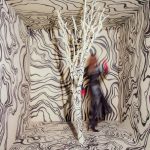
Atwood Magazine: You have a big rest of your year ahead! You're releasing Revealer, which is so awesome, and you're going on tour soon after. How are you feeling about everything?
Madison Cunningham: I’m so excited. Given the last couple of years that we all went through, being able to make music and to travel with it is nothing that I’ll ever take for granted anymore. Just getting to play my own music for people that care about it is just the most special thing. I’m very, very much anticipating a really fun tour.
That's awesome. I've been seeing all of the wonderful reception you've been getting, especially on Instagram. People are reposting your songs to their stories. It's wonderful. Before we get the scoop on your upcoming record, let's chat about your journey as a musician if that's okay. You've been playing music for your entire life, but besides it being your full time job, what keeps you coming back to creating music and why does it continue to be meaningful for you?
Madison Cunningham: Great question. There certainly is the element to it, where it’s all I’ve really ever known, and it’s something that is incredibly comfortable for me. But music can change, and it changes with you. What continues to keep it meaningful is the fact that music can speak to any phase of your life. It’s usually a direct reflection of you in that era and time period. It has been a source for me to connect with not only people, bandmates, musicians and other artists that I adore, but has helped me connect with myself and what it is that I deeply care about. It’s one of those things that you could spend your whole life trying to improve upon, and you’ll never run out of ways to do that — you’ll never run out of things to learn about it.
Definitely. It's infinite. There's so many different possibilities because there's so many things to create within music. It's so amazing.
Madison Cunningham: Yeah, exactly.
I saw that you did an NPR Tiny Desk concert. How was that experience for you?
Madison Cunningham: Oh, man. Tiny Desk is such an iconic platform, and has introduced me to so much important music. It was a surreal moment to be in that office and playing my own songs. I’m really proud of the songs that we played as well, and it just feels like the moment was earned. It was really special. It’s just one of those things where you feel like you’re in the presence of something very heavy and meaningful.
Yes! And Bob Boilen is such a wonderful person.
Madison Cunningham: He was immediately the most generous host. He greeted us at the door, waited while we took our [COVID] tests, and made us laugh. I was really impacted by how immediately generous his spirit was.

That's so awesome. So many people within the industry are just so kind and conscientious. You hear so many bad things about people within the industry, but then you get people like Bob who make it all worth it.
Madison Cunningham: Right!
Could we switch topics and chat a little bit about Revealer?
Madison Cunningham: Yeah, of course.
Awesome — so, there are a lot of themes present within the record about chipping away at this artificial image that we produce for the rest of the world. So I was wondering, how do you care for your most authentic self when working in an industry that really emphasizes the importance of holding up an image?
Madison Cunningham: That’s another really great question. It’s something that I’m constantly kind of chipping away at and working out for myself, because it’s so easy to take yourself as a sacrifice to either the image or the business — or whatever it is that people are asking of you. No one will care about your own health as much as you will. Learning how to advocate for yourself is the hardest piece. Sometimes it feels wrong — it feels like you’re putting people out in order to salvage some sort of sanity in yourself. For me, the most powerful word in the world is “No,” and the more that I exercise that and try to reserve some space for myself, the healthier I am.
You can never really feel like you’re in control, because that’s not really possible, but it makes me feel like I’m holding a sort of agency over my life. Everything has to be balanced, and sometimes it’s hard to understand balance until you’ve let yourself become unbalanced. There’s been plenty of instances like that where I’ve had to take steps forward, take steps back and go: “this is too much.” Friendships also help nurture some of those things. Having people around who can give an honest reflection of who you are, not just an image of yourself, because it’s so important to keep those two things separate in order to maintain honesty about yourself and your flaws and the things that you can improve upon as a person. That is the most important piece — it’ll always be more important than the image or whatever it is that you’re trying to do. You try to build this image so that you can get away from it and know who you are separately from it. That’s the importance of actually building an image: Separation.
Boundaries are so important, and they're the one thing that you can control.
Madison Cunningham: Very true.
The whole thing about community is also just so important. To surround yourself with people who will continuously support you and your authenticity. Definitely good points. You've said that the songwriting process for Revealer wasn't this romantic outlet, but was instead extremely tough as it basically laid all of your insecurities bare. How did you persevere through the songwriting process, even though it brought up these really difficult feelings?
Madison Cunningham: A lot of it was elbow grease, and being like: I don’t see any way out of this but through. I collected myself and the fortitude to question to myself: “What’s the worst thing that could happen here? That I have to face these feelings and sit in them, and fail at it?” Sometimes the scenarios that we build for ourselves in our mind are much scarier than the reality. And again, due to people who cared about me and were giving me good advice, they were wise to say “just keep going, don’t look back, just keep moving forward.” That was the only way to get these songs down on paper, to just keep walking ahead and trust that I would run to the right things and find the right things. That’s all I really knew how to do or what to do in that phase.
Definitely. Well, it paid off because you have a really solid album. You employ the use of a second person narrative a lot within the record, which really catches the listeners attention, because it's like you're directly calling them out by saying ''you.'' Do you find that singing these songs acts as a way of calling yourself out and reminding you of these messages as well?
Madison Cunningham: Certainly, it’s always easier to advocate for someone else or to call out someone else’s issues. Me talking to this secondary figure was definitely a means to speak directly to myself. And again, it’s always nicer to put the burdens on this imaginary person that you’re talking to — that’s the posture that a lot of these songs take, which was, in hindsight, very helpful for me to be able to lay all that stuff out and to be able to sort through it that way.
It helps make it more objective, because you're just saying it, and then you get to think about it afterward.
Madison Cunningham: Exactly. The only way to communicate to yourself what you even mean, or what you’re trying to say is just saying things until you’re like: “Oh, that resonates,” and “That feels true.” Songwriting is a wonderful platform to do that.

And it can help so many people too — it's not as insular as writing in a journal where you're the only person who's going to see it — it affects the lives of so many people, which is beautiful.
Madison Cunningham: Yeah, totally.
What was your experience on the production side of this record? What was it like working things out in the studio?
Madison Cunningham: It was so hodgepodge in a way — I did so much of it at the studio in North Hollywood, one song up in Portland, and then a song in Texas, in a studio called Sonic Ranch, and ended up finishing the record in Nashville. I felt like I was all over the map in terms of trying to capture it and trying to get the right sonic palette. I ended up just working with three producers that I really, really admire — one who I’ve worked with since I was probably 15, Tyler Chester — and then Tucker Martine up in Portland and Mike Elizondo in Nashville. I needed to be able to kind of throw paint at the wall, explore, see what was possible, and engage in childlike curiosity. That, for me, made the juxtaposition with the hard personal stuff I was going through, and really brought perspective to the table. It helped me to not just be isolated in my own head, but to have different different angles to each song.
Definitely. And speaking of different angles to each song, each song has a really distinct sonic palette, and you take a really non-typical approach to playing your guitar. It's not just average strumming or fingerpicking, but a dynamic range of sound. Were there any musical styles or traditions that inspired the guitar sound on this record?
Madison Cunningham: Yeah, I was kind of drawing from music and traditions that are very beat centric. The guitar takes more of a backseat in terms of it’s not just soloing and taking lead lines all the time, but it became a more central piece to the music. There was definitely some Afro pop influence on a couple. I needed to look outside of my general musical vocabulary to inspire new direction and a new new approach to the way sometimes guitar feels like it ought to be played, and finding a different voice, a different thing to say with it.
And there's always so many people who will tell you how a guitar ought to be played. So it's best to just kind of experiment on your own and let that develop.
Madison Cunningham: With guitar, there’s so many towering figures around that instrument who have made it theirs and have made it what it is. There’s still so much space to innovate and to learn, and to try and take it in a different direction. I don’t feel like I’ve nailed that at all, but I’m very passionate about going down that path and seeing what it could be.
You're on the way, and I think that you're already doing it. I read that you recorded most of the songs a couple days after you finished writing them. You really caught those emotions right when you were feeling them in the moment by recording them almost right away. Do you typically record songs right after you write them, or do you usually sit with them and then record?
Madison Cunningham: I’ve done it differently over the past couple of years. For my last record, I had spent so much time before actually recording the songs — writing them and finalizing them, and then we did it all live. All of the pieces had to be fully formed before we went into the studio. This time I loved the approach of just having a studio that was there, so that when I did finish a song, we could just lay it down right away. I wanted to do that, because it wasn’t something that I typically was used to doing. In some ways it made the process faster and easier, and in other ways it totally slowed it down, because it was like, now I’m just waiting on the song. It’s not like I have 12 songs that we were going to take to the studio and nail that week. Now I’ve got to go write the song in order to record it. It was good, there was a healthy flow of writing because I needed to record, but it was a different process than I was used to. It was far more about the process than it was about coming in and knocking it all out within a couple of days.
I really love the way the record naturally flows. So that's a really good approach, but either approach clearly works well for you.
Madison Cunningham: I love both. There’s merit in trying it both ways — mainly in testing yourself as an artist and doing things that you completely feel out to sea about. It’s like, “Huh, this is unfamiliar to me, and I feel a little bit lost” — that’s usually a pretty good sign for the creative process, at least.
You have to challenge yourself to grow! Your lyrics and wordplay are always amazing, but in this album, especially, they're so clever and nuanced. You can't really listen to a song without latching onto a phrase that really makes you think. Do you have a favorite lyric that you wrote on this record?
Madison Cunningham: I have two favorites. One of the ones that I think about all the time —because I have a runaway mouth sometimes, or not even that, I just am a clumsy person — so I feel like I do live with a lot of regret. My favorite line that constantly rings true for me is: “Regret is like an infant / That won’t let you sleep it off.” That one gets me through the day. Sometimes I’ll be like, “Yeah, I said something stupid.” That line was funny, so maybe it was worth it. And then there’s another song that I wrote about my sister — my favorite lyrics that describe her are: “Cussing like a drunk, and driving with her knees.” I’m always afraid when I drive with her, because it’s reckless. Those would probably be the two favorites.
Those are really wonderful lyrics that tell really different stories. I was struck by the lyric in “In from Japan” that exclaims, “Trying to be the next original in a tribute band.” Because so often are artists defined by their musical influences that they start to feel like a mere mimicry of other artists' work, because critics are always like, “This is the next like Bob Dylan,” or something like that. Is this constant comparison of artists something that you have dealt with in your time as a musician?
Madison Cunningham: Yeah! People — being very well meaning — love to draw comparisons, because that’s all we know how to do. Someone told me once that sometimes that’s the best compliment people know how to give. To us as people who are trying to make a different impression, or something new, it can feel so offensive. But there’s truth in the fact that we do have influences, and they help us get to where we are now. It’s important to give them credit. The journey of finding your own voice and what you want to say is a forever endeavor, so that line was funny to me because I just feel like sometimes we’re all just trying to say something new, but we’re still playing at a bar with a tribute band. That can mean many different things, but I definitely meant it in terms of getting tired of comparisons at times.

It can be hard, especially with genres as well. People really try to box people into genres, so when artists try something new, people say, ''Oh, you're not doing pop anymore. Why are you doing rock?'' or something like that?
Madison Cunningham: Oh, yeah. Genres are a non-binary thing. I don’t think it has to be one thing or the other. I think we should always be fluid as artists, trying new things. If people don’t want that challenge, it’s like, okay, whatever, you keep making music.
Is there a track on the record that you're most excited for listeners to hear?
Madison Cunningham: There’s a song that’s coming out. It’s called “Life According to Rachel,” and I’m so proud of the way that we captured that song. It’s one of the most important songs on the record, or at least the one that I’m the most the most proud of. So, I’m excited about that one.
I've heard a clip of it on YouTube and it's just beautiful. I can't wait to hear the mastered version. So your first record is called Who Are You Now and you have a track on this record, also called ''Who Are You Now.'' I want to pose that question to you: Who is Madison Cunningham now, compared to the person you were in the midst of creating your first album?
Madison Cunningham: I think that just through experience, and sometimes this just has to be earned — I feel a little bit more assured in who I am as an artist and in what I have to say and to offer. Again, that just comes with experience and time, and learning how to really follow what it is that interests you. It’s so easy to surround yourself with so many voices, and people telling you how you should sound and what you should be, and now I feel like I’m far more independent than I was during the making of Who Are You Now. But I wouldn’t change it at all, that experience was so amazing, and got me to 2022.
That's beautiful. Your song in that record, “Song In My Head” was the anthem to my freshman year of college. My friend showed it to me when we were sitting on the floor in one of our dorms and I was just like, “Who is this?” And she was like, “Madison Cunningham” and I was like, “Oh my gosh, I'm obsessed!” So thank you for that.
Madison Cunningham: That is the coolest thing ever, so awesome.
As a musician, there's a sort of responsibility that comes with making music. Your melodies and lyrics can change the way someone views their life. How do you balance this responsibility as a musician to your listeners with the part of you that might doubt yourself or the things that you create?
Madison Cunningham: There will always be doubt at play, and sometimes that’s a good counterpart to getting things done. If someone poses the question — meaning doubt — you or the music feels a responsibility to find the answer. For me, someone put it that creating music and songs is giving back to the creator — however you view that. It’s such a beautiful idea that writing songs is for a higher purpose and to give back — whether it is to your community, to yourself, or to some higher thing. It’s a worthy endeavor even if it doesn’t become a product. Art is a transient thing — It’s always moving, it’s always changing, but it’s always worth chasing down.
Love that about art, it can be interpreted in so many different ways by so many different people, which is just so beautiful. Artists are often asked what songs they want to cover, but I'm curious as to what musician you would want to cover one of your songs.
Madison Cunningham: Oh my God. Let me think. If Rufus Wainwright covered one of my songs, I think I would die. Fiona Apple too, or Juana Molina. If any of those artists covered one of my songs I would just cease to exist.
That would be amazing. So, what is Madison Cunningham up to when she's not writing, recording or performing?
Madison Cunningham: Usually just moseying around LA, probably at a park somewhere reading a book, walking my dog, or I’m on a hike or at a coffee shop. That’s kind of my day to day when I don’t have a guitar in my hand.
Awesome. Your dog is the cutest thing. I love seeing pictures when she pops up on your Instagram.
Madison Cunningham: She’s the best, she really is. I was talking to my husband this morning, we were both like: “Why is she so endearing? Why? What is it about her?” I think it’s her eyes, and her face looks kind of human, which I don’t see a lot of dogs. She immediately controls our lives.
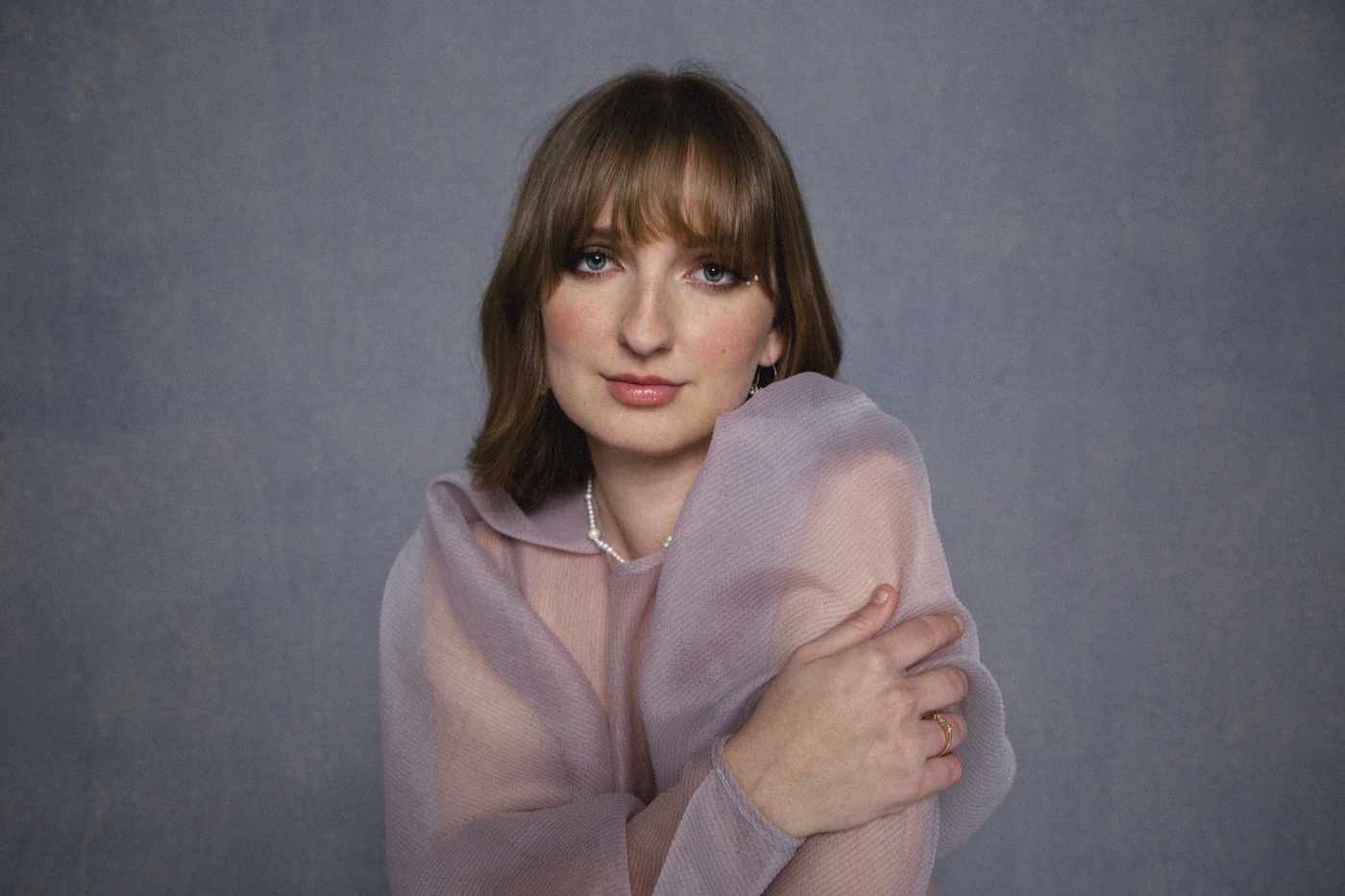
She's adorable. I like to end my interviews on a happy note, so what is currently giving you joy?
Madison Cunningham: Just being outside, because it gives me a new perspective. I spend a lot of time in my apartment and in my studio. Sometimes I feel drained by that, and I just poke my head outside. We have these beautiful hills in the back of our apartment that have all these budding flowers right now. I went on a walk there yesterday, and I’ll probably do it again today. That gives me a lot of joy.
That's awesome. There's nothing like some good old mother nature to make you feel better.
Madison Cunningham: I know! It’s basic, but there’s a reason for it.
— —
:: stream/purchase Madison Cunningham here ::
Stream: “In From Japan” – Madison Cunningham
— — — —

Connect with Madison Cunningham on
TikTok, Facebook, Instagram, Twitter
Discover new music on Atwood Magazine
? © Claire Marie Vogel
:: Stream Madison Cunningham ::

